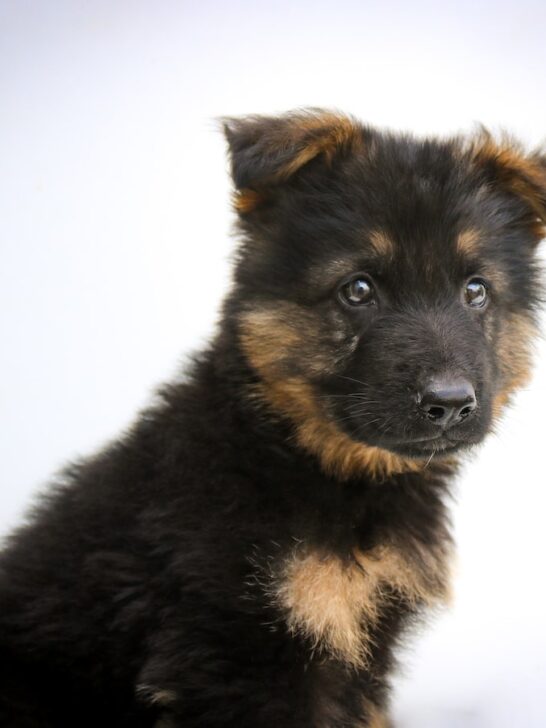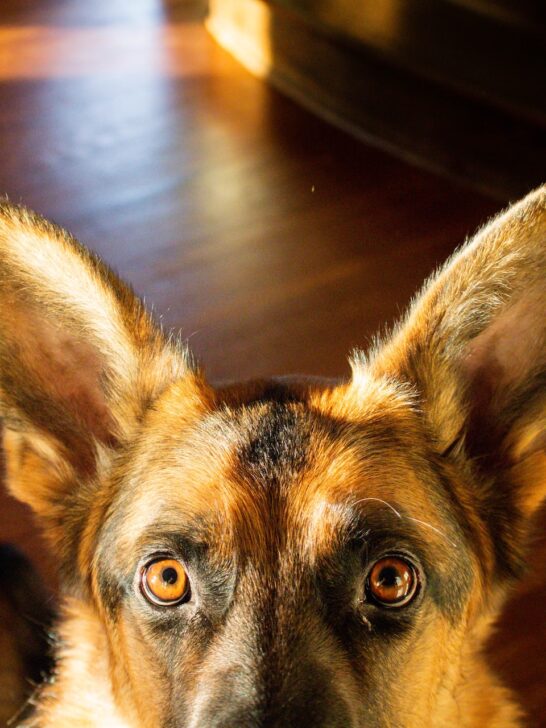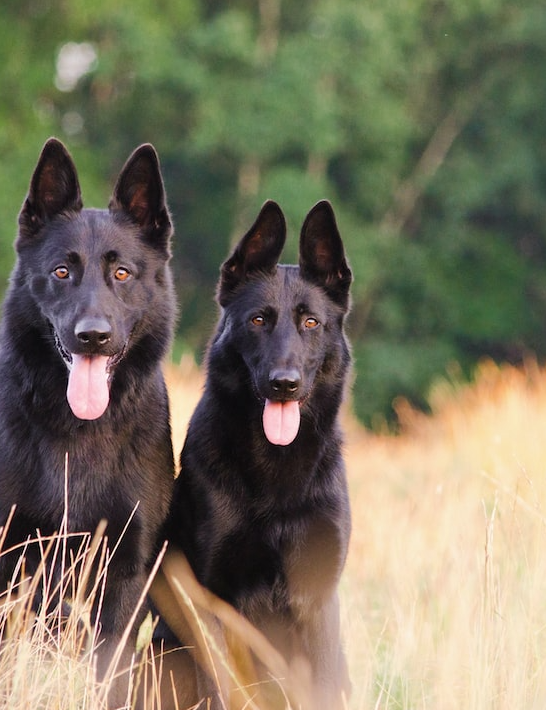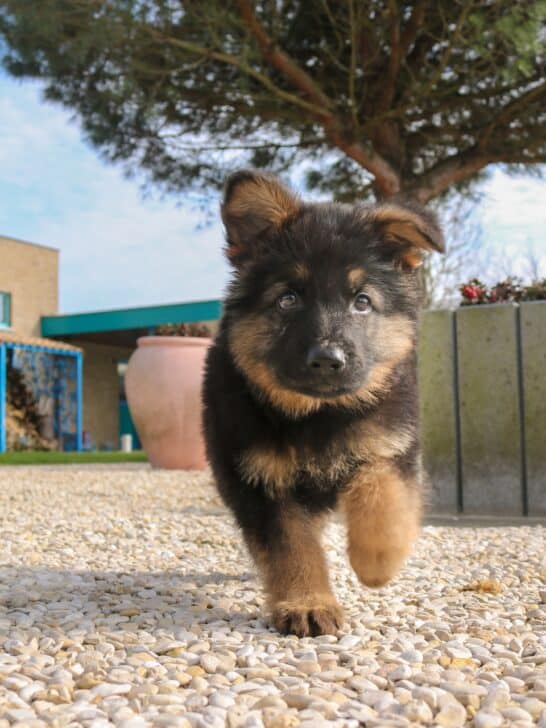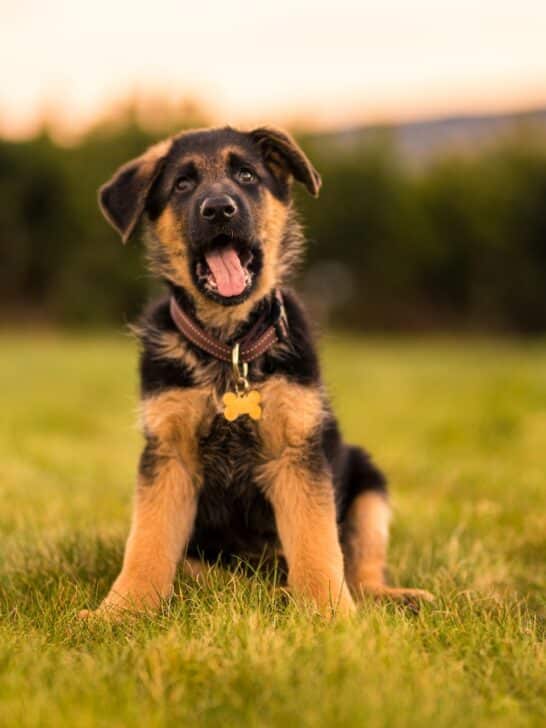German Shepherd Puppy Temperament
A German Shepherd puppy’s lively spirit and endless enthusiasm can easily capture the heart of any dog lover. These intelligent, loyal, and adaptable dogs have earned their reputation as one of the most popular breeds worldwide.
A well-rounded understanding of their temperament is essential for anyone considering bringing a German Shepherd puppy into their family.
Exploring the depths of a German Shepherd puppy’s temperament reveals a fascinating blend of traits that make these dogs so unique. From their innate intelligence and protectiveness to their boundless energy and playful disposition, each attribute contributes to the overall character of this exceptional breed.
This article explores the various aspects of German Shepherd puppy temperament, offering valuable insight to help you understand and nurture your canine friend. Read on to learn how to foster a harmonious relationship with your German Shepherd puppy by appreciating its unique qualities.
Key Takeaways:
- German Shepherds are intelligent, trainable, and excel in various professional roles, including police work, military service, and therapy dog positions.
- To effectively train a German Shepherd, start early, be consistent, use positive reinforcement, and incorporate brain games and puzzle toys for mental stimulation.
- Loyalty and protectiveness in German Shepherds can be managed by establishing yourself as a confident leader, setting boundaries, and providing guidance through training.
- Early socialization (8-16 weeks) is crucial for building confidence, reducing fear or aggression, and helping the puppy interact appropriately with the world around them.
- Encouraging independence and being mindful of your own body language and emotions during socialization positively influence the puppy’s reactions in new situations.
- Keep German Shepherd puppies entertained with dog sports, rotating toys, DIY enrichment activities, training sessions, playdates, food-dispensing toys, and teaching tricks and commands.
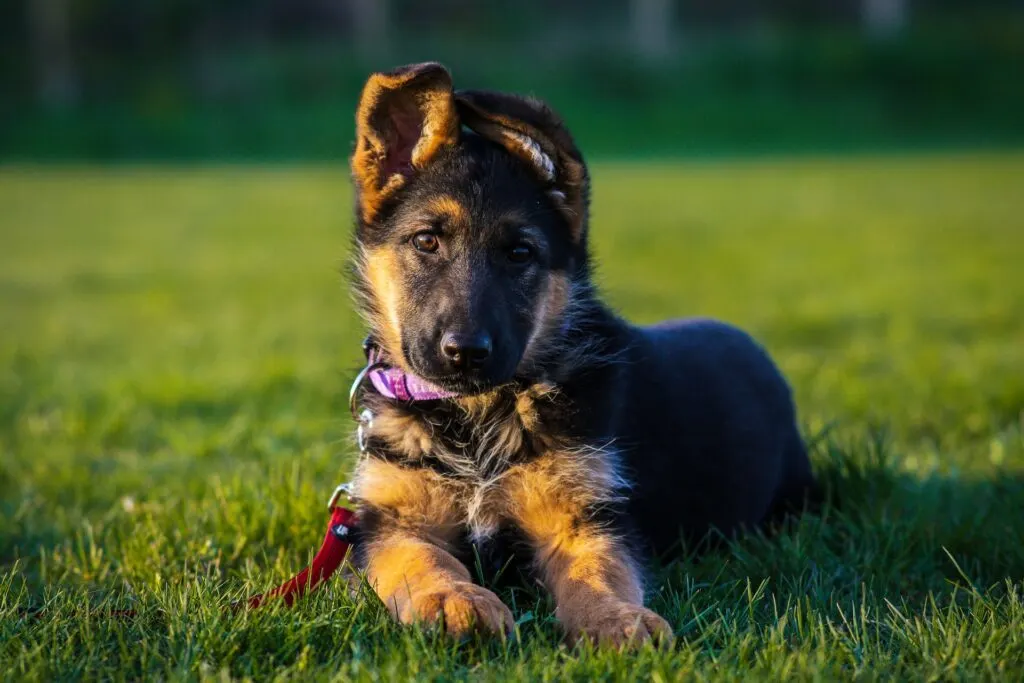
Intelligence and Trainability: The German Shepherd’s Gift
German Shepherds are renowned for their exceptional intelligence, making them highly trainable and capable of learning a wide range of commands and skills.
This breed thrives on mental stimulation and loves being challenged, which is why they excel in activities such as obedience and agility. German Shepherds are also often sought after for professional roles, including police work, military service, and therapy dog positions. This is primarily due to their incredible capacity for learning and adapting to diverse requirements and settings.
When training your German Shepherd puppy, it is essential to consider their cognitive abilities and use methods that engage their intellect. For example, incorporating brain games and puzzle toys can help sharpen their problem-solving skills while teaching them new tricks or commands can challenge their memory and concentration.
Additionally, German Shepherds respond well to consistent structure and routine during training sessions. Establish clear expectations and maintain a predictable schedule to help reinforce learned behaviors. Consistency will also provide a sense of security to your pup, allowing them to focus on mastering tasks without becoming overwhelmed or anxious.
To make the most of your German Shepherd puppy’s intelligence, it’s crucial to start training early and consistently. Use positive reinforcement techniques to reward good behavior, and vary the exercises to prevent boredom. This way, you’ll help your pup develop into a well-mannered and confident adult dog.
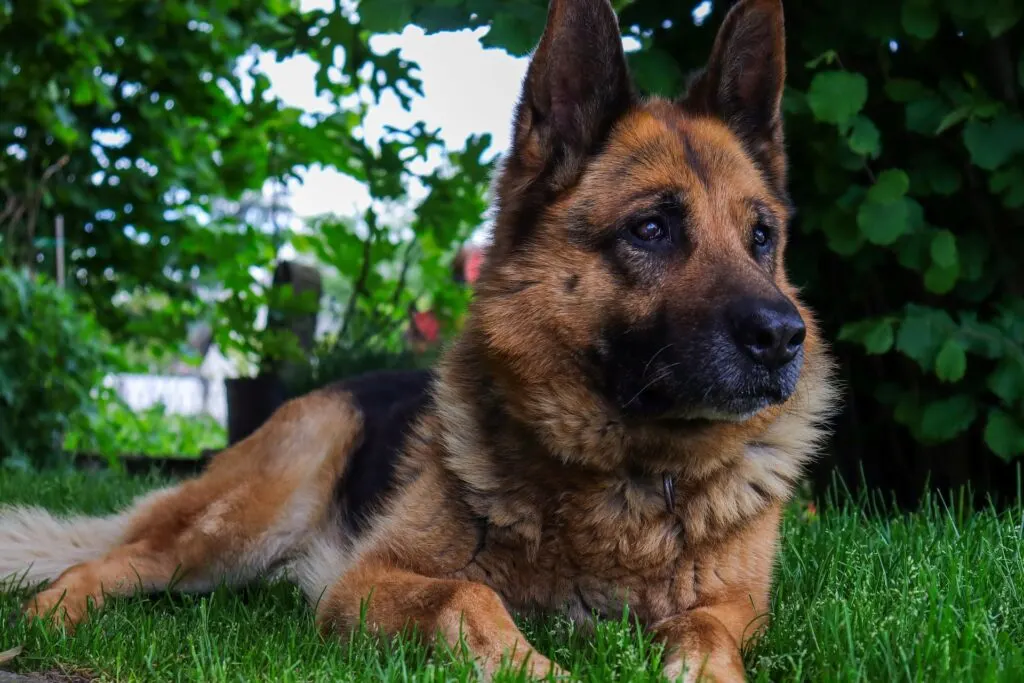
Loyalty and Protectiveness: More Than Just a Guardian
The German Shepherd’s loyalty and protectiveness make them excellent family companions. They form strong bonds with their humans and will go to great lengths to keep them safe. This commitment can be both a blessing and a challenge for owners, as it requires careful management to ensure that these instincts are properly channeled.
One way to prevent overprotectiveness in your German Shepherd puppy is by establishing yourself as a confident and capable leader. This does not mean using force or intimidation; rather, it involves practices such as:
- consistently demonstrating calm and assertive behavior,
- setting boundaries,
- providing guidance through training.
This way, you can help your puppy feel secure in their environment, reducing the likelihood of them developing excessive guarding behaviors.
It’s also crucial to expose your German Shepherd puppy to various positive experiences involving different people, animals, and environments. This will help them learn how to differentiate between genuine threats and normal situations. Regularly visiting dog-friendly parks, participating in group training classes, or inviting friends and family members for visits can all contribute to this learning process.
Socialization: Building Confidence in Your Puppy
Socialization is a critical component of your German Shepherd puppy’s development, as it lays the foundation for their ability to interact confidently and appropriately with the world around them. The window for optimal socialization typically occurs between 8 and 16 weeks of age, making it essential to prioritize this process during these early months.
In addition to planned outings and puppy classes, consider incorporating the following strategies into your socialization plan:
- Invite people of various ages and appearances to interact with your puppy in a controlled environment. This will help them become comfortable with diverse individuals and reduce the likelihood of fear or aggression toward strangers.
- Introduce your pup to different types of animals, both large and small. Doing so will help teach your German Shepherd to respect and coexist peacefully with other creatures.
- Expose your puppy to a wide range of sights, sounds, and smells. This might involve walking on various surfaces (grass, gravel, sand), encountering traffic noises or construction sounds, or visiting different environments like parks, urban areas, or bodies of water.
- Practice handling exercises regularly by gently touching your puppy’s paws, ears, mouth, and tail. This will not only help them become comfortable with being handled but also prepare them for future grooming sessions or veterinary visits.
- Encourage independence by allowing your pup to explore their surroundings at their own pace while under supervision. This will help them develop self-confidence and learn to rely on their instincts when navigating unfamiliar situations.
- Be mindful of your own body language and emotions during socialization. Your pup will look to you for cues on how to react in new situations; remaining calm and positive will help them feel more at ease.
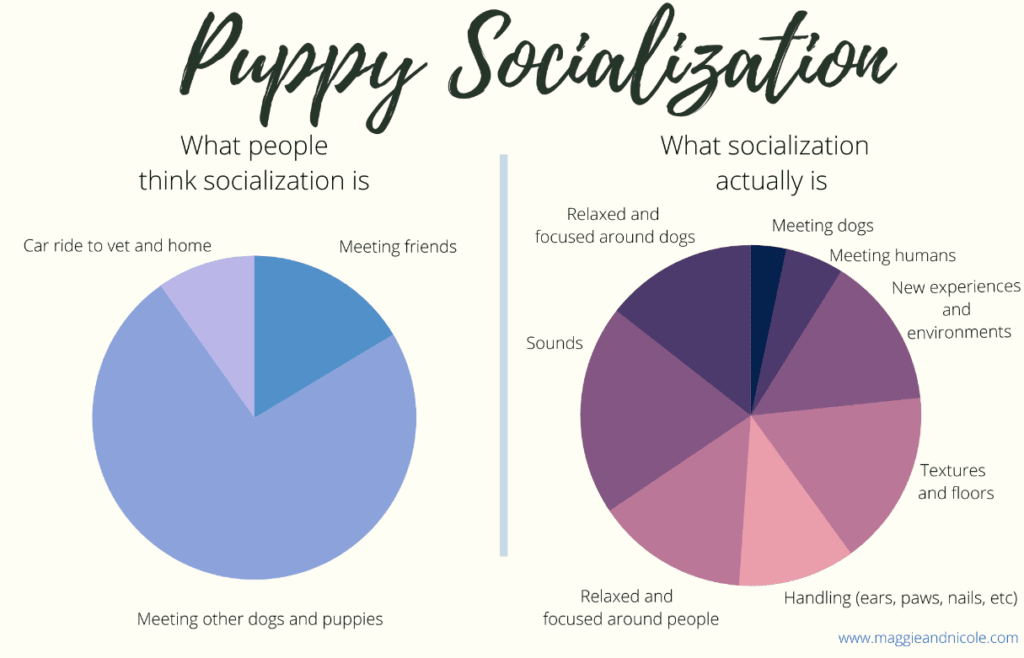
Playfulness and Energy: Keeping Your Pup Entertained
The playful nature and high energy levels of German Shepherd puppies make it essential for their owners to find creative and engaging ways to keep them entertained. Ensuring your pup has ample opportunities for physical activity and mental stimulation will promote overall well-being and prevent boredom-related behavioral issues.
- Try dog sports. Enroll your pup in canine activities like agility, flyball, or scent work. These sports provide an excellent outlet for their energy while also teaching discipline and teamwork.
- Rotate toys. To keep things fresh and interesting, regularly switch out the toys you provide for your pup. Offer a variety of options, including chew toys, tug toys, and squeaky toys.
- Create DIY enrichment activities. Use household items to create stimulating games for your pup. For example, hide treats inside a muffin tin covered with tennis balls, or create a snuffle mat by hiding kibble within a folded blanket.
- Engage in training sessions. Regular training sessions not only help reinforce good behaviors and manners but also provide mental stimulation that keeps your pup engaged and focused.
- Organize playdates. Arrange playdates with other dogs that have similar energy levels and temperaments. This will allow your pup to socialize and burn off energy through play.
- Use food-dispensing toys. Offer meals or treats using puzzle feeders or treat-dispensing toys that require your puppy to work for their reward, challenging both their mind and body.
- Teach tricks and commands. Teaching your German Shepherd puppy new tricks and commands strengthens the bond between you and provides an enjoyable way to channel their energy productively.
In Conclusion
Understanding the temperament of a German Shepherd puppy is crucial for anyone considering bringing one into their family. These loyal and adaptable dogs possess a unique blend of traits that make them exceptional companions. Their intelligence and trainability make them highly versatile and capable of excelling in various roles, while their loyalty and protectiveness make them excellent family guardians.
However, it is important to establish yourself as a confident and capable leader to prevent over-protectiveness. Socialization also plays a vital role in their development. Additionally, providing opportunities for physical activity and mental stimulation is essential to keep them entertained and prevent boredom-related issues.
By appreciating and nurturing their unique qualities, you can foster a harmonious relationship with your German Shepherd puppy, resulting in a happy and well-adjusted companion for years to come.
























